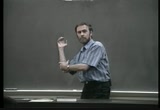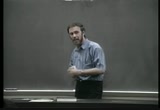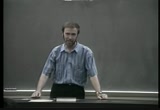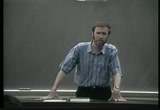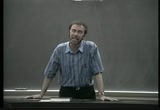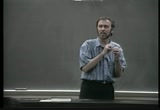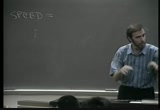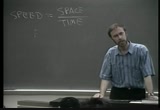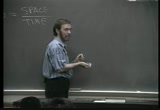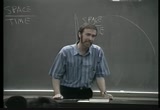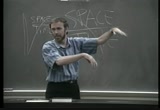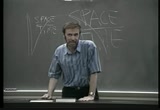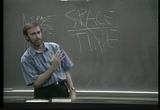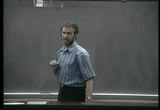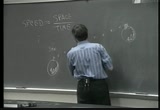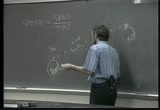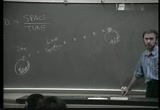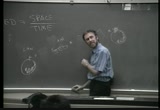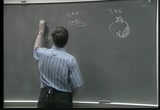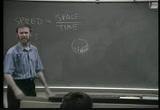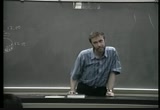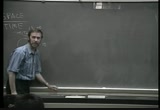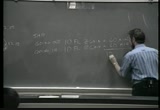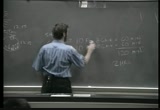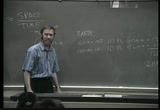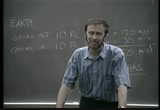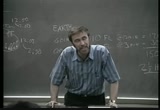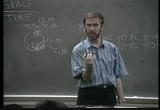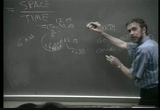tv Earth Focus LINKTV November 29, 2012 6:00pm-6:30pm PST
6:01 pm
okay, let's begin a little thought experiment. let's suppose i take a baseball. we have a baseball playing game and i throw a baseball to you. no, i don't throw it to you. i have a little machine that throws a baseball. you ever see those things? and that machine can only throw the baseball at 30 meters per second. that's how fast. 30 meters per second. it's all regulated to throw that fast. now, it's gonna throw a ball to you. you got your catcher's mitt. hit, boom, you catch. how fast do you catch it? 30 meters per second, right? that's because the machine is at relative rest to you. there's no motion between you and the machine. so you're gonna catch it at 30 meters per second. now, let's suppose you are in a truck and the truck is going that way at 10 meters per second. 10, get that? i throw the ball just like before. you catch it. how fast it's going? well, check your neighbor.
6:02 pm
you're going away. you're moving away from it. faster or slower, gang? slower. - in fact, what's the answer? - 20. you're gonna catch it at 20, 20 minutes per second, right? aboutish? let's suppose you turn the truck around and you come toward the ball-throwing machine and the ball-throwing machine throws just like before to 30, but you're now moving this way at 10 meters per second. when you catch the ball, that ball's gonna hit your glove at what speed? - 40. - we can do that, right? and if you got outside and you did that and you found out that when you traveled away, it hits slower and when you travel to it, it hits faster, you would not be surprised. you would expect that and there might be some quibbling, does that really come out to be exactly 30, exactly 40. but you know, if there's a speed-- how about if we did this really and no matter how you moved, every time you caught the ball,
6:03 pm
you still caught it at 30 meters per second? whether you're racing toward the machine still, or racing away from the machine. and you know that machine can only throw at 30 and every time you catch it, you catch it at the 30, how about it? would that be a little w-i-l-d, huh? well, that would really be wild. that can shake you up a little bit. you start to say, "wait a minute. am i dreaming? something wrong here, right?" well, let me tell you a similar thing happened, gang. a similar thing happened just before the turn of the century, 1800s. it turned out they found out that light has the same speed for all observers, whether the light source is coming to you, away, or whether you're moving away, make no difference. every time the speed of light was measured has the same value: 300,000 kilometers per second.
6:04 pm
and every measurement showed it to be the same. when the earth is racing toward the sun or toward a star or something, the same speed six months later when it's racing away, same speed all the time. this had a lot of people upset. the physics community was starting to shake a little bit. and about this time, there was a fellow who was going through school. at the age of four, he could hardly talk. in grade school, he did not really stand out too much, but he plugged away. an uncle gave this fellow a compass on his ninth birthday or something like that. he says, "how come the compass always point north?" and the uncle says, "well, that's--it always points north." the young fellow says, "well--?" and the uncle says, "i won't be knowing such thing. "i mean there's probably no reason for that. compass is just pointing north, okay?" i'm making this up a little bit, yeah? but it turns out--who are we talking about now? albert einstein. albert einstein. and albert einstein went through school. oh, he took algebra in high school and flunked. hey, don't knock it. some people pass, some people flunk. i mean he's just one of the ones that flunked, okay?
6:05 pm
don't make a deal of it. and some people get a high school diploma and some people don't, right? some can hack it, some can't. right? well, einstein couldn't hack it. that's all right. you know, you can still make it. no high school diploma, gang. and he's out there and it turned out that he met a young lady who influenced him to go back to school. so he tried going back to school. took the entrance exams and flunked. and he flunked the exam. hey, i mean he cannot-- not everybody passes everything, huh? and then he studied hard and he took the entrance exams again and passed. turned out he had trouble with the french language. you know, in europe they speak all these languages. he couldn't do the french so well. anyway, albert einstein went through school and he did go all the way and got his ph.d. got his ph.d. in physics. and about this time, he had a hard time getting a job. his thinking was a little bit-- well, for one thing, he didn't have a high regard for many of the ideas at the time. you know, we always name the streets after military heroes, you know, and if someone really butchers millions of people, man, they put a big monument up for him, right? einstein thought that was kind of upside down. that we weren't choosing our heroes very properly. you know, he had kind of funny ideas.
6:06 pm
anyway, he wasn't too popular and had some trouble getting a job. but he did get a job with the help of his lady friend again. and he get on at the patent office, i guess, in switzerland, going over patents that were being submitted. and here's a guy with his ph.d. in physics and all that. anyway, he was interested also in light. he asked a teacher one time, "what would a light beam look like as it goes by?" teacher was, "well, it's going too fast, you can't see it." "you know, what if you go along with it and take a look?" "what do you mean, what if you go along with it and take a look?" "well, how would it look? "will it be a little squiggly wave? what it would look like?" he's all the time asking questions like that, never getting any answers. and he was wondering about the bit with light: light having the same speed for all observers. it's a matter of some history whether he knew about the experiments by michelson and morley-- you read about that-- that told that light speed was the same for all observers. it's even questionable as to whether he knew about that experiment. but the more he thought about light, the more he realized that if you did travel with light, it would look just as if you were at rest
6:07 pm
and everyone ought to see the speed of light traveling the same, regardless of their motion. and here's some of the reasoning that kind of went into that. let's look at what speed is, by definition. what is speed? see, the speed of light's the same for everyone that measures it. what's speed? it's a distance compared to time. distance through what? space. okay. so, it's really space compared to time, see? we measure it kilometers per hour, okay, meters per second, okay, space per time. and einstein realized that the reason the speed of light is constant-- in some instance perhaps maybe more space should traveling, in which you travel through, then corresponding that more time will be taken. and if something happens where maybe he puts only a small bit of space, because of motion, then the time will be smaller in turn. einstein realized
6:08 pm
that the ratio of space to time for light would be constant, like the ratio of the circumference of a circle to the diameter. for a big circle... a little circle, boom. that ratio is a constant. and einstein felt that these two were related. who would think that what time it is on your clock would be related to like space, as we know it? space and time. einstein said that if you travel through space, you'll also travel through time. how? such that the ratio of space to time for light will be constant. so, we do know the speed of light is a constant and that's one of the postulates of einstein's special theory of relativity. everyone who measures the speed of light will get the same value. now, that has some interesting consequences. let's try a little thought experiment here. i'm gonna throw this piece of chalk up in the air.
6:09 pm
now, we're all observing what's happening here. let's suppose we made measurements as to the speed of the chalk. in this case, it varies, because it's going quickly here, slow, slow, slow, and it's accelerating, okay? so, we just kind of fudge it up a little bit. let's talk about the average speed. we would get the average speed by taking the distance divided by the time. that would give us the average speed. and let's suppose every one of us makes careful measurements and we all get the same average speed, okay? but here's the postulate, that no matter how i move, we will still all get the same average speed. well, right here, this is not controversial. you see it go up, you see it go down. you see it go through that particular space and you measure on your watches that particular time. i measured the same thing. i measured the same space, i measure the same time. we all get the same value. i'm gonna repeat. this time, i'm gonna move. i'm gonna look at it and you look at it.
6:10 pm
i see the same thing as before. i saw the same thing as before, okay? i saw it go straight up and straight down. get into an airplane and flip a coin. what's the path? straight up and down, right? now, get outside the airplane and look at the path. whoosh, whoosh. okay? you guys saw this. watch again. you guys saw it go like this. now, if you get the same speed, you don't, you really saw it moving faster. but if you got the same speed, if you did, if the speed is the same and the space is admittedly bigger, then the only way you can get the same speed, gang, is if you get a longer what, beginning with a 't'? time. and so your witnessing of that event, your timing of the event and my timing of the event, would be different. a lot or a little, begins with a 'l'? - lot. - no. a little bit different. a little bit different, okay?
6:11 pm
but i exaggerate the figures. ratio's the same. einstein could see that something's funny going on with light too. because take this example, einstein at one time is sitting in a cable car, he's gonna cable car through the streets and looks up and sees the village clock. and every village always has a big tower and a big clock in there, okay? and the clock says-- and the clock says 8:00. okay, that means the little hand's on the 8:00 and the big hand's on the 12:00. did you hear me? okay? now, einstein is sitting there. he says, "what does it mean to say the clock reads 8:00?" what it means is that light is bouncing off the clock and coming down and giving me information, 8:00. if it's midnight and there's no lights around and the moon is out, he's not gonna see anything. but it's in the daytime, in the morning, yeah? so he sees 8:00. einstein wonders, "wow, 8:00, boom, hit me like that.
6:12 pm
what happen...i move my head?" won't the 8:00 keep going? now, the 8:00 had pssh... meeting some guy way, way down there, who later on, boom, says, "it's 8:00." now, it's 8:00 when it passed me. but how about some guy way, way down there? uh-huh? how about some guy in some planet way, way out there? it takes time for that 8:00 information to move. isn't that true? when light leaves the sun, you know how long it takes to get to us? eight minutes. the sun is eight light minutes away, gang. eight minutes away, you see. okay? so, anyway, einstein-- what if that 8:00 information keeps going? now, what if this cable car started to try going on with it? and what if this cable car went as fast as light goes and the cable car keeps going out, occupants in the cable car would look at the clock and they'd see what, gang? how would they see the clock? what would the clock say? eight, eight, eight, eight, eight, eight, eight...
6:13 pm
he would see time frozen, at least the clock. is that understandable? you see? so he'd see the time completely frozen. so einstein realized if he stays still, he can watch that clock do its thing, at the rate that we call 24 hours per day. 12 hours it makes-- it comes all the way around one time, yeah? but einstein realized if he moves as fast as light, then he sees it frozen. now, often times, when you're thinking about ideas, it's nice to look at the extremes. he's looking at the extremes there. one extreme is zero speed, what do we see? the ultimate speed, what do we see? and they're quite different. now, what's in between? what's in between zero and the speed of light? do we see the clock slowing down? do we see the clock running a little slower? how about it, gang? check your neighbor. if you went like near the speed of light, but not quite the speed of light, would you see the clock running just as fast, if you stayed still? think about that and discuss it.
6:14 pm
how about it, gang? how many say, "yeah, i think it would go slower?" i think we would see it going slower anyway. from our frame of reference, we would see the time slower. yeah. that's right. i wanna talk to you about the twin drip, which is discussed in the book, but i wanna preface something. i wanna preface that trip with a little hardcore physics. pay attention, gang. let's suppose someone's standing on a planet here and they have a flashlight and they shine a flashlight off to a distant planet over here. and people on this distant planet are gonna have a telescope all lined up here and they're gonna stand right here and they're gonna watch the flashes of light. and let's suppose a person here emits a flash of light every three minutes. this little flash, flash...
6:15 pm
i got a question for you. if there's no relative motion between the two planets, it's gonna take some time for that first flash to get up here. but under zero gravity here, boom, sees a flash. how long they're gonna have to wait for another one? three. - and the next one? - three. - and the next one? - three. they'll come at regularly spaced intervals, all right? now, let's suppose i have a rocket ship that's traveling at a very, very high speed between the two planets. now, this rocket ship is traveling away from the planet, the source of light. will that rocket ship see the flashes as often as three minutes apart or more compressed to more often than three minutes apart or kind of stretched out? check your neighbor. see, the rocket ship catches this flash. if the rocket ship waits here, this flash will come by in three minutes. but the rocket ship doesn't wait there. the rocket ship travels up here.
6:16 pm
so that three-minute flash is gonna be stretched out a little bit. do you see that? so the flashes will be seen less frequently, same speed, but less frequently. difference now, okay? let's pretend that the rocket ship travels so fast that the rocket ship sees the flashes six minutes apart. can we see that that could be the case? okay, so the rocket ship sees them six minutes apart. it's like when you're listening to sound: neeeh... now you travel away from it, neaaaah... that kind of goes down, right? the pitch goes down. here's sort of that pitch is going down, the frequency at which you see those flashes goes down if you move away. this is called the doppler effect, okay? so this person sees them every six minutes. now we're gonna invoke einstein's first postulate: that all light is seen to travel at the same speed by all observers. what the ship does is every time it receives a flash, it's got its own little beacon here
6:17 pm
and it emits a flash and it directs those flashes to this observer. now, these flashes are gonna be emitted every six minutes on the rocket ship. but won't the flashes keep right up with the flashes by the earth types? so let me ask you a question. these six minutes flashes, six minutes apart flashes are gonna be seen by this observer to be how many minutes apart? three. so when a rocketeer gets up here, he's gonna say to his friend, "hey, how'd you like my flashes, six minutes apart?" the friend's gonna say, "with all due respect, those flashes, honey, were three minutes apart." "no, they were six." he says, "i saw 'em at three." could be? yes. so, six minute flashes by a moving source can be seen over here to be three minutes apart. let's put that information over here. a person seeing that ship approach will see six minute flashes, six minutes apart, every three minutes.
6:18 pm
okay? now, let's come back here and look. every three minutes, they are blipped off, sees them at six. i'm gonna ask you a question, use your reasoning. let's suppose instead the sender over here sends 'em every six minutes, you know, half as many flashes. if they were sent every six and nothing changed, how often would they be seen here? - 12 - every 12. now, here's einstein's second postulate: all the laws of physics will be seen to be the same in uniformly moving reference frames. this is moving uniformly with respect to this. in fact, einstein said, it makes no difference whether this is at rest and this is moving or this is at rest and this is moving away. motion really is relative. it's a relative motion between the planet and the ship. so, let me ask you a question. these six minute flashes that the ship really is sending--
6:19 pm
really is sending the six, we agreed on that before-- these six minute flashes are gonna be seen how long apart by that person back here, who's now looking, who puts the telescope up and takes a look? check your neighbor. what's the answer, gang? - 12. - 12. you see that. i mean if 6 is seen as 12, then 6 will be seen as 12. so we can complete this diagram up here and say this. we have another planet here. a person watching these flashes, okay? what happens? really the flashes are like this, okay? they're all scrunched up in here and all dragged out here. and so, six minutes will be seen three for approach, but for a recession, 12 minutes. do you kind of see that? now, these flashes act as a clock. a clock is anything that's periodic. you could say that clock usually is a pendulum swinging back and forth, right? or vibrations in a crystal lattice, okay? in this particular case, the clock is regularly spaced flashes of light
6:20 pm
and one can keep track of time by counting up the flashes of light. so far so good? let's see what happens if we apply this to space travel. here's the earth, our cradle, gang. that's our cradle, the cradle of humankind. what do we do with cradles, by the way, even if they're comfortable? - we outgrow. - we outgrow them, that's right. and we see that starting to happen now, don't we? the spaceship's going out. we're talking about space platforms, okay? anyway, this is our cradle right here and here comes our rocket ship, same one, streaming by. and we're gonna say at this point, boom. both times are 12:00 noon. 12:00 on the ship, 12:00 on the earth and the ship continues. now, what the ship is gonna do? it's gonna take a one-hour trip out and it's gonna turn around very quickly.
6:21 pm
so quickly that the time is negligible in comparison to the hour trip. so ship is going out, turn around and come back. it's gonna take one hour going out and one hour coming back with negligible turnaround time. and we're gonna see how time compares for people on the ship who are moving relative to the earth and how time compares on earth relative to the ship. now, 100 years ago, the answer would be "ss" same-same, but we find out nature is not that way. nature is more interesting, because watch what happens, gang. our ship's gonna go out for 60 minutes. onboard the ship, we're gonna emit a flash of light every six minutes. okay? every six minutes, we're gonna emit a flash. and the people on the earth are gonna count the flashes. then, we're gonna turn around and we're gonna continue to emit a flash every six minutes.
6:22 pm
six minutes, mmm, precisely. off goes a flash, got it? question time: during the outgo of the ship, that 60 minutes, how many flashes will the ship get off? 10. 10 is 6 minutes apart and you get 60 minutes. try it. - 10. - 10 flashes. so while the ship is going away, it's gonna emit 10 flashes. those flashes will get to the earth. the first one's right away. the flashes will ultimately get to the earth. so the earth types gonna set up a telescope and they're gonna start counting flashes. okay, 10 flashes going away. then it gotta turn. when it comes back in, how many flashes are gonna be emitted by the ship coming back in? 10. how many minutes apart? six, okay? so let's look at that. ship point of view, ship frame of reference. going out: 10 flashes, 6 minutes apart = 60 minutes.
6:23 pm
coming back in: 10 flashes, 6 minutes apart = 60 minutes. the total time, gang? 120 minutes. convert that to hours. can you do it? how many hours? two hours. now, i got a question for you. when that ship-- as soon as it passes the earth, what is the time on a ship? what's it gonna be, gang? it's gonna be 2:00 and it'll be 2:00 on the ship when the ship gets back. do you believe that? any funny business here? straightforward stuff. 2:00 on the ship that's been gone for 2 hours. let's see what the earth types think about that.
6:24 pm
the earth types, how many flashes they're gonna see for the ship going out, beginning with a 't'? 10. okay? how often are these flashes gonna be seen when a ship going away? 12. 12 minutes apiece, honey. 12. it's up here, huh? going away this 6-minute flash is gonna be seen at 12-minute intervals. let's look. what's 12 times 10? 120 minutes, right there. shouldn't you label that, the ship's point of view? oh, i now wanna label this here "earth." thank you very much. saved again, saved by lee. all right, lee. from the earth's frame of reference, 10 flashes would be seen in 120 minutes altogether. gang, when the earth type is looking at a telescope and sees that 10th flash, that's when the ship turns around.
6:25 pm
he's got the 10th flash, then he looks down or she looks down, looks at the watch. what does their watch say? 2:00! the ship's still out there. something's going on. see why people got excited about relativity? now the ship coming back in, how many flashes coming back in? 10. how often they're gonna be seen? three. - what's ten 3s? - 30. even i can do that. add those up. 150. - what's 150 in hours, gang? - 2 1/2. can you see, it's 2 1/2? 120 will be two when you get there. huh, huh, okay. so it's 2 1/2 hours. how much time has gone by on the earth during this ship's two-hour trip? 2 1/2 hours, gang. and when that ship comes back, what is the time on the earth? on the ship, it's gonna be 2:00.
6:26 pm
so it's taken a trip that long, but on the earth it's gonna be 2:30. so what will seem to take 2 hours for the ship will take 2 1/2 hours for the earth. so the traveling person doesn't age as much as the person who stays at home. adventure gang, get out there and keep jogging. you know, so i walk back and forth all the time, uh, all right? yeah. questions on that, lee? the point of view of the person in the ship, if we ignore the turnaround, which we gave negligible time, why did it seem like the earth went away at the speed and then came back at that same speed? yes, yes. this is what's been called the twin paradox. why couldn't it as well be the same for the other observer? why can't it be that maybe the spaceship is at rest and the earth moves away? okay? well, here's the hitch.
6:27 pm
it's not a symmetrical situation, because if that happened, the earth moves away, then the earth-- if it keeps moving away, we'll never know. but it's gotta turn around and come back. and so, one switches from one realm-- i'd like to put it like this, switching space-time realms. you know, we all live in some particular space, don't we? it happens to be in this particular room, right now, right? on the earth, duh-duh-duh, right? how about time? do we all share the same time? yes, we do. according to relativity theory, we're all at rest relative to one another. we will all agree with how fast clocks move and we're all sharing the same realm of time. but as soon as i-- now i'm moving. now i'm in a different time than you guys are in. my clock is moving differently than yours. a lot or a little? even without the hand, what is it? a little. that's right, because i'm moving how? a little. how about if i move fast? how about if i move like this fast? then, little turns into a lot. so it's a matter of degree.
6:28 pm
so when you move, you're in a different realm and you know you're traveling different space. hey, you're in a different realm of time and that is kinda wild. so what happens? it's the ship that's in one realm of time, coming out and in another realm of time, coming back. how about people on the earth? one realm. and one way to check that is to bring a cup of coffee with you that's brim filled. if the cup of coffee stays brim filled, stays right there, then that's an indicator that you're not changing realms of time. but when you accelerate, the coffee spills. that acceleration marks the change from one realm of time to another. so, they're on different realms. so, it doesn't come back. they can meet again at the same space, but at the expense of time. but when the rocket is going at a steady speed, the earth seemed to be slowed down compared to it? yes, yes, yes. if flashes are being emitted by the earth, then the ship sees those slowed down too. would you like to see that? can we get into that? how many of you'll say, "no, information overload.
6:29 pm
i've got too much to digest already." can we switch frames of reference and see if it still works? let's try it. let's suppose instead of the fellow over here with the telescope, we put a person over here shining a light, okay? a light beam's gonna go off and now the ship observes, all right? now, the person on earth is gonna flash a light every six minutes. okay? now, the ship's going out. now, the ship is gonna watch those flashes. how long apart will those flashes appear to people on the ship? do you see it's 12? they're gonna go out for 60 of their minutes. how many flashes will they see 12 minutes apart in their 60 minutes? all of you can figure that out. five. good. so, going out, the ship types are gonna see five flashes.
62 Views
IN COLLECTIONS
LinkTV Television Archive
Television Archive  Television Archive News Search Service
Television Archive News Search Service 
Uploaded by TV Archive on

 Live Music Archive
Live Music Archive Librivox Free Audio
Librivox Free Audio Metropolitan Museum
Metropolitan Museum Cleveland Museum of Art
Cleveland Museum of Art Internet Arcade
Internet Arcade Console Living Room
Console Living Room Books to Borrow
Books to Borrow Open Library
Open Library TV News
TV News Understanding 9/11
Understanding 9/11
